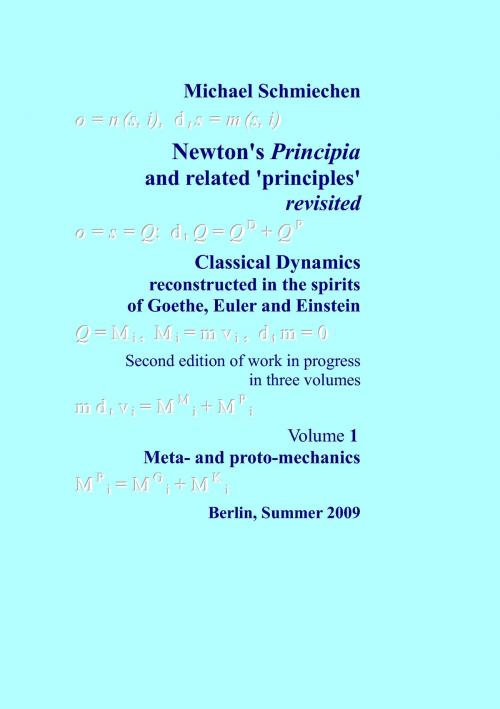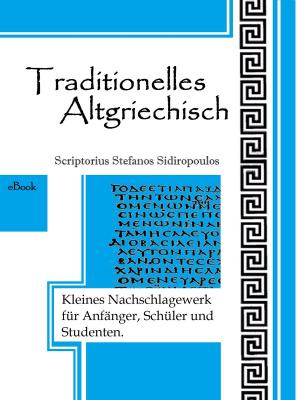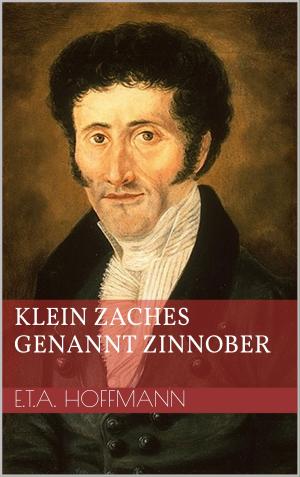Newton's Principia revisited
Volume 1: Meta- and protomechanics
Nonfiction, Science & Nature, Science| Author: | Michael Schmiechen | ISBN: | 9783839160008 |
| Publisher: | Books on Demand | Publication: | January 4, 2011 |
| Imprint: | Language: | English |
| Author: | Michael Schmiechen |
| ISBN: | 9783839160008 |
| Publisher: | Books on Demand |
| Publication: | January 4, 2011 |
| Imprint: | |
| Language: | English |
PROBLEM. The treatise is devoted to the reconstruction of our 'instinctive beliefs' in classical mechanics and to present them 'as much isolated and as free from irrelevant additions as possible'. The same motivation has driven many authors since the publication of Newton's Principia. IMPORTANCE. Classical mechanics will remain the basic reference and tool for mechanics on terrestrial and planetary scale as well as the proto-theory of relativistic and quantum mechanics. But it can only serve its purpose if it is not considered as obsolete, but if its foundations and implications are understood and made 'absolutely' clear. METHOD. Based on the 'instinctive belief' that the foundations of classical mechanics cannot be found and reconstructed within mechanics itself but only 'outside', classical mechanics is 'understood' by embedding it into an adequate theory of knowledge and adequate proto- and meta-theories in terms of the 'language of dynamics'. Evidence is produced that available philosophical expositions are not adequate for the purpose at hand. Mechanics is treated as part of physics, not of mathematics. Not sophisticated mathematical artifacts, necessary for solving specific problems, but the intellectually satisfactory foundation of mechanics in general is subject and purpose of the exercise. The goal is reached using axiomatic systems as models. SCOPE. Following an account of the unsatisfactory state of affairs the treatise covers the epistemological foundations, abstract proto-mechanics, i. e. the theories of time and space, meta-mechanics, i. e. the theories of state space models and of quantities proper, and, as an instance of the latter, abstract elementary mechanics, the theory of translational motions of 'small' solid bodies in three-dimensional Euclidean space, including classical general relativity. Subsequently the theory of classical kinematics is developed as basis for interpreted proto-mechanics and interpreted elementary mechanics. As an amusing interlude classical special relativity is treated in detail. On the basis of a model of matter suggested by Newton's 'Definition IV' and d'Alembert's principle a theory of inertia and gravitation has been developed, which is in accordance with the standard model of nucleons and may be of interest to physicists. Gradients of the mass potential of physical space are considered as causes of momentum productions in bodies of ponderable matter. This point of view permits to avoid many problems so far unsolved. Further, classical macroscopic mechanics is treated as continuum mechanics. Accordingly Cauchy's universal equation of motion is considered as the root of the healthy tree of classical mechanics. All its global branches including 'generalised' mechanics are shown to be 'nothing but' weighted integrals of the basic local momentum balance. The final chapters deal with the theories of dynamics and kinematics of rigid bodies in vacuo and in fluids. The rational theories of motions and propulsion of bodies in fluids, developed by the author, demonstrate the power of the axiomatic approach. The treatise proper ends with a section on motions in wave media. The closing operations of evaluation, assessment and conclusions provide an executive summary, the assessment of the results so far and the decisions based on these results. READERS. All teachers and students of physics and mechanics, theoretical and applied, as well as of didactics, philosophy and history of physics and mechanics, in fact everybody interested in understanding, in Goethe's sense, the world we live in.
PROBLEM. The treatise is devoted to the reconstruction of our 'instinctive beliefs' in classical mechanics and to present them 'as much isolated and as free from irrelevant additions as possible'. The same motivation has driven many authors since the publication of Newton's Principia. IMPORTANCE. Classical mechanics will remain the basic reference and tool for mechanics on terrestrial and planetary scale as well as the proto-theory of relativistic and quantum mechanics. But it can only serve its purpose if it is not considered as obsolete, but if its foundations and implications are understood and made 'absolutely' clear. METHOD. Based on the 'instinctive belief' that the foundations of classical mechanics cannot be found and reconstructed within mechanics itself but only 'outside', classical mechanics is 'understood' by embedding it into an adequate theory of knowledge and adequate proto- and meta-theories in terms of the 'language of dynamics'. Evidence is produced that available philosophical expositions are not adequate for the purpose at hand. Mechanics is treated as part of physics, not of mathematics. Not sophisticated mathematical artifacts, necessary for solving specific problems, but the intellectually satisfactory foundation of mechanics in general is subject and purpose of the exercise. The goal is reached using axiomatic systems as models. SCOPE. Following an account of the unsatisfactory state of affairs the treatise covers the epistemological foundations, abstract proto-mechanics, i. e. the theories of time and space, meta-mechanics, i. e. the theories of state space models and of quantities proper, and, as an instance of the latter, abstract elementary mechanics, the theory of translational motions of 'small' solid bodies in three-dimensional Euclidean space, including classical general relativity. Subsequently the theory of classical kinematics is developed as basis for interpreted proto-mechanics and interpreted elementary mechanics. As an amusing interlude classical special relativity is treated in detail. On the basis of a model of matter suggested by Newton's 'Definition IV' and d'Alembert's principle a theory of inertia and gravitation has been developed, which is in accordance with the standard model of nucleons and may be of interest to physicists. Gradients of the mass potential of physical space are considered as causes of momentum productions in bodies of ponderable matter. This point of view permits to avoid many problems so far unsolved. Further, classical macroscopic mechanics is treated as continuum mechanics. Accordingly Cauchy's universal equation of motion is considered as the root of the healthy tree of classical mechanics. All its global branches including 'generalised' mechanics are shown to be 'nothing but' weighted integrals of the basic local momentum balance. The final chapters deal with the theories of dynamics and kinematics of rigid bodies in vacuo and in fluids. The rational theories of motions and propulsion of bodies in fluids, developed by the author, demonstrate the power of the axiomatic approach. The treatise proper ends with a section on motions in wave media. The closing operations of evaluation, assessment and conclusions provide an executive summary, the assessment of the results so far and the decisions based on these results. READERS. All teachers and students of physics and mechanics, theoretical and applied, as well as of didactics, philosophy and history of physics and mechanics, in fact everybody interested in understanding, in Goethe's sense, the world we live in.















